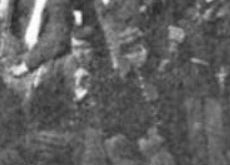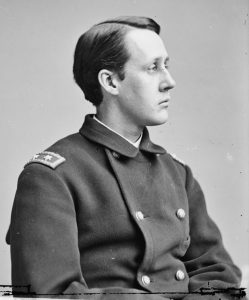Recruiting The Regiment…Or Recruiting A Future General
It officially began with a terse note to a friend:
The time has come, remember your promise. Meet me at Delmonico’s at four o’clock to-day, Saturday, and we will enlist. F.C. Barlow[i]
It ended four years later, and the author of the short note would be a major general of volunteers. The promise referred to a conversation which had occurred nine months earlier in the midst of a political discussion. The young, ambitious, struggling lawyer and Harvard graduate had listened to his friends and finally interrupted the debate, saying, “You may talk politics until you are deaf and dumb but slavery in this country can be ended only by war, and war is sure to come, and all of you must be prepared to enlist.” One of the friends, James A. Scrymser, responded, “Frank, I will, if you will.”[ii] On April 20, 1861, five days after President Lincoln’s call for 75,000 volunteers to put down the rebellion, New York City was alive with the recruitment scene, and the short note had arrived for James Scrymser.

The two young men—both in their twenties, though Barlow was senior by several years—were of the right age and background to be particular excited for the Union cause. Francis C. Barlow particular had much to gain by a war, and later writings suggest he knew it in the earliest days or figured it out rather quickly. He had influential connections from his childhood in the Transcendentalist, Massachusetts community of Brook Farm and had graduated first in his class from Harvard in 1855. Moving to New York City, Barlow had been admitted to the bar as a lawyer, but worked for one of the large newspapers, presumably to keep the bills paid while he built his reputation and law practice. A war, even a short one like this conflict was predicted to be, could potentially vault a young man into a position with reputation and power if he did something exceptional or gained hero status.
A degree of calculation appears in Barlow’s first steps on that afternoon in New York City. He did not enlist without considerations, though exactly what he was looking for is hazy in the currently available accounts. He met his friend Scrymser outside Delmonico’s, one of the earliest restaurants in the city which had already been pleasing patrons for more than a decade with its exceptional cuisine, pastries, and fine liquors.[iii] Whether the pair dined, smoked, or drank at the restaurant that day went unrecorded, and Scrymser simply reported that they “wandered up Broadway.”[iv]
“That thoroughfare was a glorious sight; many of the buildings were decorated with flags and patriotic emblems and the martial spirit was everywhere in evidence. Recruiting squads, with fife and drums and flags, were parading the street with recruits and these recruits were later escorted to the armories and there enrolled. Barlow and I had formed no definite plan of enlisting and decided to look around before doing so. We visited several armories, finally arriving in front of the Twelfth New York State Militia Armory, Colonel Daniel Butterfield.”[v]
Nicknamed the “Independence Guard,” the 12th New York State Militia was designated in 1847 and over the following years different companies rotated in and out of its ranks between other local militia units. The 12th already had a history in New York City from when it had helped to quell the Astor Place riots in 1849. With the presidential call for troops, militia regiments across the north responded by recruiting new members and preparing to muster into national service. The 12th was completing its recruitment of ten companies on April 20, and the unit’s departure for Washington D.C. loomed on the following morning. In the previous months, generous supporters of the unit had donated $10,000 to equip the militia regiment with new uniforms and weapons.[vi]
“The Twelfth Regiment Armory was on Broadway just north of the old Metropolitan Hotel,” recalled Scrymser. “On the doorstep of the armory I recognized a friend of mine, Capt. Alfred Jones, in gorgeous uniform. I hailed him and asked what regiment he belonged to and what was his rank? Jones replied, “It’s the Twelfth Regiment of New York and I am its Chaplain and it’s a d—n good regiment!”[vii] (omission original)
The fine uniform and acquaintance had turned Scrymser’s head, but Barlow was intrigued in a different way. “The remark seemed to captivate Barlow, who declared that a regiment that had a Chaplain who could swear was the regiment in which we should enlist, and enlist we did, in the engineer corps as Third Sergeants.”[viii] This conflicts with other accounts that claim Barlow enlisted as a private; hopefully some official enlistment documentation exists in an archive somewhere to clear up the possible discrepancy between accounts.
Though he was giving up some freedoms while voluntarily joining the “Independence Guards,” Barlow managed to get his liberty for one more night before military discipline would take over the majority of his life. He had signed the papers, and “The Company Sergeant ordered us to report at midnight. Barlow demurred slightly to this order, explaining to the Sergeant that he was going uptown to be married. He promised, however, to report for duty at daylight the next morning.”[ix]
Both Barlow and Scrymser turned up the at the intersection of Broadway and 14th Street the next morning, where their chosen regiment formed for departure. “The following morning, Sunday, April 21st, the Twelfth Regiment, one thousand strong, was deployed on Union Square, the right resting on Fourteenth Street. It was an exciting time: crowds were rushing to and fro, goodbyes were being said and enthusiastic “God bless yous” were heard on every side.”[x]
According to a volume of 19th Century New York military history: “The regiment assembled in Union Square, the regular members and their substitutes wore their old regimental uniform, but the recruits wore their ordinary clothing with military belts and equipment. A supply of muskets had been obtained, and guerrilla like, as the raw recruits looked, there was hardly ever a finer body of men gathered together, and the spectators by their enthusiasm, showed what they expected of them. Great masses of the population turned out to do honor to the departing Militia. It was with difficulty that the regiment made its way through the crowd to the wharf.”[xi] That afternoon the regiment embarked on the steamer Baltic and steamed out of New York Harbor, destined for Annapolis, Maryland, and a relatively boring few months.
The militia unit mustered into United States service on May 2, 1861, dedicating for three months of service. The predictions declared the war would be over by the end of that period. The 12th stationed around Washington, drilling, picketing, and skirmishing. They participated in the occupation of Arlington Heights, then moved into the lower Shenandoah Valley to skirmish near Martinsburg and Bunker Hill in July; they missed the First Battle of Bull Run in July 1861 and mustered out of service in New York City on August 5. In January 1862, the 12th Militia and the 12th New York Volunteers combined and mustered in and out of national service several times during the Civil War for short periods, usually not more than three months. The 12th New York State Militia did its duty during the Civil War years, but it did not take an exceptional role on the battlefields.[xii]

Francis Barlow ditched the 12th New York after mustering out in August 1861. Disillusioned with his military experience, he had informed his mother by letter that “If I had stayed home & gone out & slept in the pig pen at night I should have had about the same experience that we have had here…”[xiii] He was still ambitious and had the unquenchable urge to get into combat and prove himself. The 61st New York Volunteer Regiment was recruiting and he joined as lieutenant colonel, then commanded the regiment as colonel within a few months. By 1862, his promotion to brigadier general arrived, followed in 1865 with promotion to major general of volunteers, though he had commanded divisions of the XI and II Corps since 1863.
When the volunteers signed their names (or made their marks) in 1861, no one knew how long the war would last or which enlisting man would rise to leadership or command in the four years that still stretched into the future at that moment. That day that Francis Barlow enlisted himself, he began his military service which would ultimately set him up for a successful, post-war political career. How much was impulsive and how much was calculated in his decisions on April 20th is blurred in research at this time.
Three years later, though, Barlow would brusquely tell a friend who had volunteered on his division staff, that others were “geese…to go into a regiment so well-officered as our best Massachusetts regiments…if we expected any promotion….”[xiv] Clearly, Barlow self-confidently claimed that he had secured his own military success and promotions by choosing lesser-known units where competition for command would not have been as difficult once he had started mastering the military skills and knowledge that he had initially lacked with his civilian background. However, the young general’s theory did not impress his friend who preferred a more sociable life, commenting, “We all should have gained in rank, and lost in pleasant companionship and associations by following Barlow’s example…”[xv]
Was this pattern of thinking in his mind as he wandered Broadway with James Scrymser, looking for a particular unit to join? Was it a whim or a rebellion against his utopian religious upbringing to enlist in a regiment with a swearing chaplain? Perhaps time and further study will better explain the enigma of Barlow’s pride and success, taciturn and gentleness, perceived cruelty and high ambition, strict discipline and self confidence.
One thing is clear with hindsight. The 12th New York State Militia enlisted a future general and one of the hardest fighters in the Army of the Potomac into the Union cause. They just had no idea on April 20, 1861.
Sources:
[i] Personal Reminiscences of James A. Scrymser, In Times of Peace and War – James Alexander Scrymser. Accessed at Google Books: https://play.google.com/books/reader?id=iakEAAAAYAAJ&hl=en&pg=GBS.PA18 Page 9.
[ii] Ibid, Page 9.
[iii] Delmonico’s https://www.delmonicos.com/about/
[iv] Personal Reminiscences of James A. Scrymser, In Times of Peace and War – James Alexander Scrymser. Accessed at Google Books: https://play.google.com/books/reader?id=iakEAAAAYAAJ&hl=en&pg=GBS.PA18 Page 9.
[v] Ibid., Page 9-10.
[vi] 12th Regiment of New York National Guard History: https://museum.dmna.ny.gov/unit-history/infantry/12th-regiment-new-york-national-guard
[vii] Ibid., Page 10
[viii] Ibid., Page 10.
[ix] Ibid, Page 10.
[x] Ibid., Page 10.
[xi] 12th Regiment of New York National Guard History: https://museum.dmna.ny.gov/unit-history/infantry/12th-regiment-new-york-national-guard
[xii] Ibid.
[xiii] Francis C. Barlow to Almira P. Barlow, July 9, 1861.
[xiv] Henry Lee Higginson. Life and Letters of Henry Lee Higginson, Volume 1. 1903. Page 225.
[xv] Ibid.

Essential points, thought provoking questions. Barlow’s motives likely paralleled others who moved from Massachusetts to New York City in the 1850s. Land shortages in Massachusetts due to partible inheritance prompted many to move to NYC for social mobility. Building a reputation in an anonymous society, prior to modern forms of identification, likely factored. The self-reliance, self-help, self-made, and self-interest ethos of the early 19th century also motivated. If he had post-millennial views, then joining the war could be perceived as bringing about that outcome. From a pragmatic standpoint, joining a fire department, police department, or the military in the 19th century usually offered entry into politics. Opportunities for military promotion always increase during wartime. He seemingly embraced the ideological concept of merit and talent over privilege, and seized his opportunity.